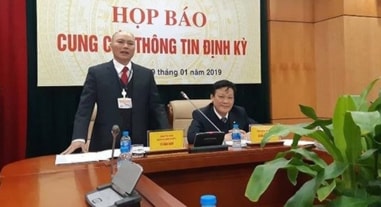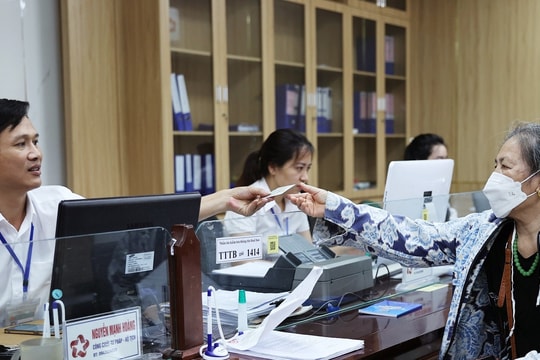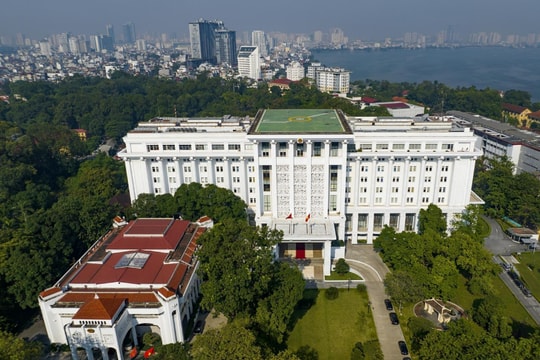Ministry of Home Affairs talks about setting examples and the Public Service Culture Project
At the regular press conference on the afternoon of January 9, the Ministry of Home Affairs responded to four basic contents of the Public Service Culture Project.
At the regular press conference on the afternoon of January 9, the Ministry of Home Affairs answered many questions from reporters about the significance of the Central Regulation No. 08-QDi/TW on the exemplary responsibility of cadres and party members and the Public Service Culture Project recently issued by the Government for the current cadre management work.
 |
| The Ministry of Home Affairs held a regular press conference to provide information. Photo: PLO |
4 basic contents of the Public Service Culture Project
Regarding the incident of using a public car to pick up a family member of Minister of Industry and Trade Tran Tuan Anh, which has caused a stir in recent days, Deputy Minister of Home Affairs Nguyen Duy Thang said that yesterday afternoon (January 8), the Ministry of Industry and Trade posted a document explaining the matter on its website. The Minister of Industry and Trade has accepted responsibility and apologized.
Chief of Office, Spokesperson of the Ministry of Home Affairs Vu Dang Minh added that the Law on Cadres and Civil Servants clearly stipulates what cadres and civil servants are not allowed to do (previously the Ordinance on Cadres and Civil Servants had provisions).
It states that civil servants are not allowed to take advantage of their position and influence to seek personal benefits. The rights and benefits of civil servants are also stipulated in the law. In addition, party members, leaders and managers must also comply with the Party's regulations.
Discussing the Public Service Culture Project, Deputy Director of the Institute of Science - State Organization (Ministry of Home Affairs) Le Anh Tuan said that this is a relatively difficult project, and there are many different opinions during the construction process.
The project has four basic contents:
Firstly, it is related to the spirit and working attitude of cadres and civil servants. This comes from the characteristics and requirements of public service culture in the coming time, which need to promote and improve the working efficiency as well as the spirit and responsibility of cadres and civil servants.
Second, the Project adds a number of standards in communication and behavior of cadres, civil servants, and public employees towards colleagues, superiors, and some departments with management positions.
This stems from the fact that in recent times, a number of cadres, civil servants, and public employees lack training and education, and do not yet recognize the role of public service culture, so in the process of behaving within the agency with each other, between superiors and with the outside, there are still many problems, and communication standards must be improved.
Third, regulations on ethical standards and lifestyles of cadres and civil servants. In the process of performing their duties and responsibilities, it is necessary to improve the ethics and lifestyles of cadres, civil servants and public employees. Some contents have been inherited from the regulations in Decision 129/QD-TTg on office culture and some other regulations.
Fourth, regulations on the uniform of cadres and civil servants, along with sanctions related to solutions to perfect related legal regulations such as the Law on Cadres and Civil Servants, the Law on Public Employees... Strengthen propaganda, raise awareness of implementing regulations, organize good implementation of regulations; inspect, check and supervise annually.
Clarifying the rapid appointment of officials
Also at the press conference, Deputy Head of the Department of Civil Servants and Public Employees (Ministry of Home Affairs) Nguyen Tu Long responded to the rapid appointment of Ms. Vuong Mai Trinh (31 years old) as Deputy Chief of Office of the Long Xuyen City Party Committee, An Giang province.
Accordingly, Ms. Trinh was directly recruited as a civil servant (due to a mistake of having a foreign master's degree but being granted domestically). She then had to take the civil service exam even though she was holding the position of Deputy Chief of the City Party Committee Office.
Mr. Nguyen Tu Long said that the recruitment of civil servants has been decentralized to the province, but the selection process for special cases without examinations has been sent to the Ministry of Home Affairs for review. An Giang province is seriously reviewing all cases, not just Ms. Trinh's case.
According to him, in personnel work, it must be handled seriously but with reason. The case is being reported to the competent authority to have a common handling measure for similar cases.
Deputy Minister of Home Affairs Nguyen Duy Thang requested the Department of Civil Servants and Public Employees to immediately and thoroughly review this case. If the province has submitted a report, it should report to the Ministry's leaders. If it has not, it should request the province to report./.








